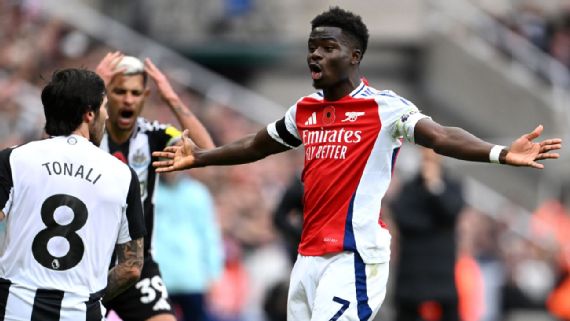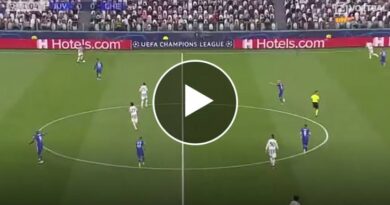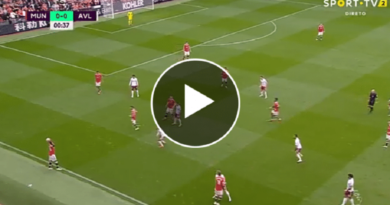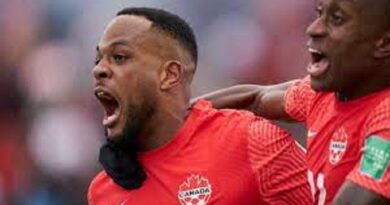Arsenal Premier League Hopes Batter by Unlikely Rivals Newcastle
Arsenal Premier League Hopes Batter by Unlikely Rivals Newcastle
The handshakes were cursory and the celebrations prolonged. Newcastle United boss Eddie Howe said Saturday’s 1-0 win over Arsenal “means so much more” because of recent poor results, but there is another reason; Alexander Isak‘s 12th-minute header not only dented the Gunners’ Premier League title hopes, but also deepened one of the division’s more unlikely rivalries.
Howe and Mikel Arteta have attempted to make their sides more combative and streetwise as they eye grander prizes. As a result, when these teams clash, sparks tend to fly. This was another feisty affair — albeit without the acute flashpoints of the past — but the seismic consequences of Newcastle’s win creates a new chapter in the growing animosity between two clubs with no geographical or historical reason to square off until recent years.
Newcastle’s Saudi Arabian-led takeover in 2021 awoke a sleeping giant determined to gatecrash the established elite, a place where Arsenal have habitually resided despite waiting 20 years for a league title. Arteta refused to think in those terms despite missing an opportunity to close the gap on Liverpool (who won their match later on Saturday, while defending champions Manchester City also lost) at the top of the table but couldn’t help a small dig at Newcastle on his way out of St James’ Park.
“You know the game they want to play,” he said after the match. “It’s clear. You get dragged into that kind of game too often and we weren’t good enough and didn’t have enough answers to get out of that constantly.”
Howe dismissed Arteta’s assessment as “irrelevant,” like any other “outside noise.” Both managers are too savvy to be drawn into open warfare, but the enmity between Newcastle and Arsenal undoubtedly exists and has grown in recent years.
On-field frustration
Newcastle inflicted a damaging 2-0 defeat on Arsenal at the end of the 2021-22 season that effectively ended their hopes of Champions League qualification. Although the Gunners’ insipid performance that night triggered a furious reaction from Arteta, his ire was focused inward rather than towards his opponents given they mustered so little threat despite the stakes in play.
Things changed in January 2023. Newcastle held Arsenal 0-0 at Emirates Stadium in a match featuring escalating anger and frustration as the visitors defended resolutely and frequently slowed the game down. The ball was in play for around eight minutes less than the Premier League average for a match at the time. Arsenal were aggravated further in injury time as a late penalty appeal for a handball from Jacob Murphy was not awarded by referee Andy Madley and VAR did not intervene.
Arteta and Howe exchanged heated words on the touchline and afterwards the Spaniard said: “We had so many situations and then we had two scandalous penalties. They are two penalties, it’s very simple. I’m talking about what I’ve seen, now, and it’s two scandalous penalties. I am not sure why they set up like that. They haven’t set up like that against any team this season.”
A source has told ESPN that Arsenal subsequently used the example of Newcastle’s running the clock down that day — which began early in the first half — in subsequent conversations with Professional Game Match Officials Limited (PGMOL) on how to improve officiating. There was, then, particular satisfaction when Arsenal returned the favour during a 2-0 win at St James’ in May 2023.
Howe said: “They slowed it down. Lots of breaks in play, frustrating for us. Naturally, we wanted the ball in play more, especially when you’re chasing the game.” Arteta said in response: “For sure, our team isn’t like that.” Except they are.
Before Saturday, since the beginning of the 2022-23 season, Arsenal have received 21 yellow cards for time-wasting. Only Aston Villa (34) and Chelsea (24) recorded more. After the first five games of this season, Arsenal delayed restarting play more than any other team, on average for 34 seconds.
In their first nine league games of the season, the Gunners had received seven yellow cards for time-wasting — a league high. That can partly be explained by Arsenal needing to manage games having gone down to 10 men on three separate occasions, but it is also a measure of the street-smarts Arteta has attempted to instill in his young squad.
Newcastle have a habit slowing the game down, too. Since the start of the 2022-23 season, only Leeds United (51 minutes and 58 seconds) have been involved in matches with less time where the ball is in play than Newcastle (54:06). Arsenal are 10th by that particular metric on 56:51.
In his customary style, Howe tried to diffuse the situation before Saturday’s game by claiming accusations of his side time-wasting and employing “dark arts” were “in part, over-hyped and talked about more because we were [winning and leading games] a lot that season.”
Yet on Saturday, Arteta bemoaned the number of fouls his team conceded — 18 to Newcastle’s 16 — and his frustration at the type of game this became. After starting well, Isak scored, the momentum shifted and Newcastle dug deep and defended — with a degree of comfort — for almost all of the second half as Arsenal struggled to break them down. This time, at least, Arteta kept his frustrations in check on the touchline.
Off-field friction
The tension between the two clubs truly exploded last season when Arsenal visited St James’ Park. A tight game was settled by a solitary goal which the Gunners believed should never have stood. Anthony Gordon‘s 64th-minute strike secured a 1-0 win for Newcastle after surviving three separate VAR checks to determine whether the ball went out of play, if there was a foul in the build-up and for a possible offside.
Arteta was apoplectic afterwards, saying: “We lost the match because of the clear and obvious decisions. It’s embarrassing. A disgrace. That’s what it is — a disgrace. You cannot imagine the amount of messages I got saying this cannot continue. I am wasting my time. We are wasting our time. I don’t want to be in the hands of people.”
Sources have told ESPN that Arsenal had been engaging in what they felt was constructive dialogue in an effort to help improve the standard of officiating in the league, and Arteta’s postmatch comments should therefore be viewed through that prism rather than any abuse of the match officials. It was an argument which formed a key part of Arteta’s defence at an independent Regulatory Commission hearing after the FA charged him with misconduct.




